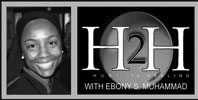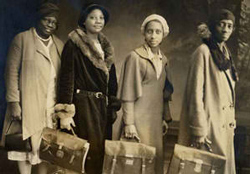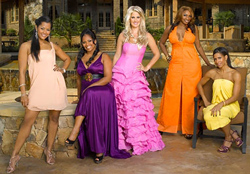The Real Housewives of Detroit?
By Ebony S. Muhammad | Last updated: May 4, 2011 - 12:33:36 PMWhat's your opinion on this article?
 When you see or hear the word “Housewives” what image enters your mind? Is it one of loud and boisterous women who thrive in the midst of drama? Is it one of catfights, scandals and parties without a purpose? Or is it an image of Black women considered dignified and regarded as the cornerstone of the rise of Black economics? Ironically, the latter describes the original Housewives, affectionately known as the Housewives' League.
When you see or hear the word “Housewives” what image enters your mind? Is it one of loud and boisterous women who thrive in the midst of drama? Is it one of catfights, scandals and parties without a purpose? Or is it an image of Black women considered dignified and regarded as the cornerstone of the rise of Black economics? Ironically, the latter describes the original Housewives, affectionately known as the Housewives' League.
During the 1930s Great Depression, Northern Blacks organized and strategized “boycotting some businesses while favoring others.” The launch of the “Don't Buy Where You Can't Work” and “Spend Your Money Where You Can Work” campaigns demanded that White store owners hire Black employees if they wanted patronage and profits from Black consumers. These

Housewives League of Detroit (.ca 1933)
'It is evident that if we do not know our history, someone else can rewrite it and rename it. Why call the show the Real Housewives as if implying there was a previous group of women with the same name but with an obviously different purpose?' |
The Housewives' League of Detroit was founded in June of 1930 by Fannie B. Peck after she had been inspired by a lecture describing how Harlem housewives had supported local CMA stores (Black owned and operated). By 1935, the Detroit league grew to over 12,000 members who were divided into 16 neighborhood units. Members pledged to support Black businesses and professionals, buy Black-produced products, and help train Detroit's young people for careers in business.
The first Junior Unit of the Housewives' League of Detroit was organized in 1935. According to Mindfully.org, there were six Junior Units of children between the ages of 6 and 15. A High School and College Educational Unit of boys and girls between the ages of 15 and 21 was organized in 1946. These units helped to instill in the minds of our youth and young people progress through self-help and an appreciation of Black-owned and controlled businesses.
According to the Detroit Public Library, other chapters of the Housewives' League included Harlem, N.Y. (1,000 members by 1931), Baltimore, Md. (2,000 members), Chicago, Washington, D.C., Cleveland, and Pittsburgh. In many of these places a mix of working- and middle-class members came together in a notable break with the middle-class-dominated Black women's club movement. Out of these local chapters a National Housewives' League of America was established in 1933 and promoted its own nationwide “Don't Buy Where You Can't Work” campaign.

“Real” Housewives of Atlanta (2011)
|
It is evident that if we do not know our history, someone else can rewrite it and rename it. Why call the show the Real Housewives as if implying there was a previous group of women with the same name but with an obviously different purpose? This imposter Housewives is not designed to inspire, motivate, unify, initiate, or promote change and economic growth in the Black community at all. If I had to describe its purpose it would be to humiliate, divide, enjoin viewers into senseless and less than dignified behavior, promote scandal and mischief, as well as keep the viewers distracted from the reality taking place around them. Are they teaching the young girls and women how to be business owners, economic producers, and supporters of like-minded professionals? Not at all.
The Housewives' Leagues affirmed, “We emphasize and declare it to be most desirable to own our own business and manage it ourselves, while we recognize as an act of fairness the employment of (so-called) Negroes in businesses owned and operated by other racial groups, yet we feel that the solution of our economic problem is the ownership of business, and to this end we shall confine our efforts.”
We are now being faced with similar circumstances and financial conditions that are forcing us to go and do for self as well as support and promote the businesses of our brothers and sisters. We must create our own jobs, source of wealth and means of exchange if we are to survive the fall of this country's economic system.
(Ebony Safiyyah Muhammad is a Certified Thanatologist specializing in grief and loss. She is a depression and stress management specialist, and is a candidate for her license as a massage therapist. To learn more visit http://www.hurt2healing.org/.)
INSIDE STORIES AND REVIEWS
-
-
About Harriett ... and the Negro Hollywood Road Show
By Rabiah Muhammad, Guest Columnist » Full Story -
Skepticism greets Jay-Z, NFL talk of inspiring change
By Bryan 18X Crawford and Richard B. Muhammad The Final Call Newspaper @TheFinalCall » Full Story -
The painful problem of Black girls and suicide
By Charlene Muhammad -National Correspondent- » Full Story -
Exploitation of Innocence - Report: Perceptions, policies hurting Black girls
By Charlene Muhammad -National Correspondent- » Full Story -
Big Ballin: Big ideas fuel a father’s Big Baller Brand and brash business sense
By Bryan Crawford -Contributing Writer- » Full Story






 Click Here Stay Connected!
Click Here Stay Connected!








